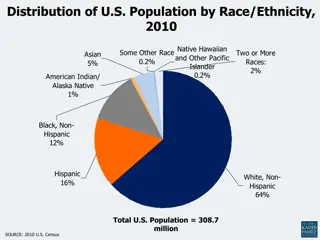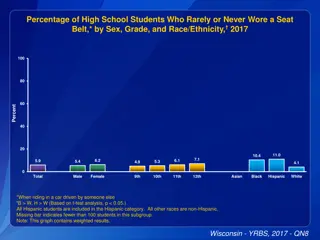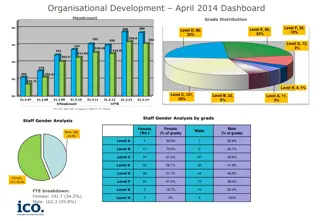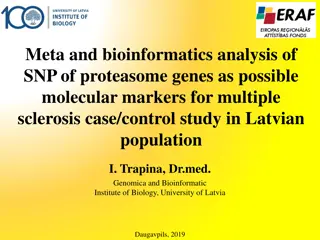Understanding Race and Ethnicity Issues in Society
Race and ethnicity play a significant role in how people are treated differently in society, leading to discrimination and racism. This content explores the impact of race on individuals and highlights the importance of addressing prejudices and biases. It sheds light on how ignorance and fear lead
1 views • 11 slides
Planning Your Flow Cytometry Experiment: Building a Staining Panel
For successful flow cytometry experiments, it is crucial to plan your staining panel carefully by selecting appropriate markers and antibodies. Determine the goal of your experiment, research historical data for similar experiments, and choose markers specific to your cell type. Utilize resources fo
0 views • 19 slides
Enhancing Your Writing: The Power of Discourse Markers
Explore the importance of discourse markers in writing, such as linking words, sequencing words, illustrating phrases, cause and effect indicators, comparing terms, qualifying conjunctions, contrasting transitions, and emphasizing expressions. Understand how these tools help create cohesion, guide r
2 views • 10 slides
SRAP Markers: Feasible Tool for Invasion Genetics of Freshwater Fish
Molecular tools, like Sequence-Related Amplified Polymorphism (SRAP) markers, play a crucial role in studying invasion genetics of freshwater fish. SRAPs offer a reliable and efficient way to assess genetic diversity and variations in non-native species, aiding in population genetics studies of inva
1 views • 5 slides
Understanding Genetic Markers in Molecular Mapping
Genetic markers play a crucial role in gene mapping within molecular biotechnology. They are fragments of DNA associated with specific genomic locations, aiding in identifying DNA sequences and analyzing genetic variation. Various types of genetic markers such as RFLP, SSR, and SNP offer insights in
1 views • 26 slides
Understanding Biochemical Markers of Myocardial Infarction
This lecture covers the criteria for diagnosing myocardial infarction (MI), features of ideal MI markers, the significance of plasma marker changes, and properties of markers such as cardiac troponins, creatine kinase, and myoglobin. It also discusses the new markers used for diagnosing MI and provi
1 views • 29 slides
Exploring the History of Waymarkers: From Roman Milestones to Modern Signs
Delve into the fascinating world of waymarkers, from their significance in guiding travelers in the past to their evolution into modern signposts. Discover the importance of milestones, fingerposts, and guideposts, and learn how these markers have shaped our journeys throughout history. Explore the
0 views • 8 slides
Understanding Race and Ethnicity in Sociology: An Overview
This content explores the traditional definitions of race and ethnicity, discussing their biological and sociological aspects. It delves into the physical characteristics of different racial groups, such as the Caucasian race, and presents various racial classifications throughout history. The disti
0 views • 18 slides
Recommendations for Screening Adherence to Oral Bisphosphonates in Osteoporosis
The International Osteoporosis Foundation and European Calcified Tissue Society Working Group provides recommendations for screening adherence to oral bisphosphonates in osteoporosis. Low adherence to bisphosphonates can lead to reduced efficacy and cost-effectiveness in treating osteoporosis. The w
0 views • 18 slides
Predictive Performance of CSF A1-42 and Tau on Cognitive Decline and Dementia Progression
Analysis conducted at the Perelman School of Medicine, University of Pennsylvania, evaluated the predictive performance of cerebrospinal fluid markers A1-42, t-tau, and p-tau181 on cognitive decline and progression to dementia. The study included 2401 ADNI1/GO/2 CSF samples from individuals across d
0 views • 19 slides
Survey on Racism and Ethnicity in College Communities
This survey delves into the prevalence of racism and ethnicity in college communities. It covers data on gender demographics, perceptions of racism, experiences of witnessing and being targeted by racism, and the stance against racism among college instructors and staff members. The findings highlig
0 views • 18 slides
Understanding Racial and Identity Profiling Act (RIPA) in California
The Racial and Identity Profiling Act (RIPA) in California requires law enforcement agencies to collect demographic data and other identifying characteristics based on officers' perceptions during pedestrian and traffic stops. The purpose of RIPA is to eliminate racial and identity profiling, improv
3 views • 18 slides
Guidelines for Question Setters and Markers in English Class Eight
Today's lesson focuses on providing guidelines for question setters and markers in English class eight. The lesson emphasizes the importance of hygiene for good health and well-being, touching on topics such as cleanliness, maintaining a clean environment, and personal hygiene practices like bathing
0 views • 31 slides
Understanding Ethnicity and Ethnic Conflicts
The concept of ethnicity involves both primordial and constructivist perspectives, with primordialists viewing it as an inherited identity and constructivists as a social construct based on fictive kinship. Perceived differences among ethnic groups can lead to conflicts, often rooted in historical e
0 views • 23 slides
Economic and Social Outcomes by Race/Ethnicity in Vermont - REAP July 2020
This report presents data on economic and social outcomes by race/ethnicity in Vermont as of July 2020. It includes information on racial/ethnic population shares, education levels, school enrollment, and field of bachelor's degree for various racial/ethnic groups. Disparities and trends among diffe
5 views • 19 slides
Demographic Insights on Race/Ethnicity, Health, and Care in the U.S.
The data reveals the distribution of the U.S. population by race/ethnicity in 2010, highlighting percentages for Native Hawaiian/Other Pacific Islander, Asian, Hispanic, Black, White, and other groups. It also presents statistics on the distribution of Hispanic Americans, no usual source of care for
0 views • 23 slides
Seat Belt Non-Usage Among High School Students by Sex, Grade, and Race/Ethnicity in 2017
The data from 2017 shows the percentage of high school students who rarely or never wore a seat belt, categorized by sex (male, female), grade (9th, 10th, 11th, 12th), and race/ethnicity (Asian, Black, Hispanic). The percentages range from 11.0% to 4.1%, with variation based on the mentioned factors
0 views • 208 slides
Bridging the Gender and Ethnicity Pay Gap: Fostering Workplace Equity
Breaking barriers and fostering transparency are essential steps in addressing the gender and ethnicity pay gap. Achieving workplace equity requires a multifaceted approach, including a stringent legal framework, promoting pay transparency, challenging traditional gender stereotypes, cultivating a c
0 views • 6 slides
Colorectal Cancer Projects Overview
This document outlines two projects conducted by the GI Collaborative Group focused on detecting and monitoring colorectal cancer using plasma protein markers and ctDNA/aberrantly methylated DNA markers. Project 1 aims to develop a panel of plasma biomarkers for the detection of adenomas and CRC, wh
0 views • 7 slides
Role of REG3 and I-FABP in HIV-Related Gut Permeability and Inflammation
This presentation highlights the significance of Regenerating Islet-Derived Protein-3 (REG3) and Intestinal Fatty Acid Binding Protein (I-FABP) in microbial translocation, inflammation, and reservoir size in individuals living with HIV. REG3 and I-FABP serve as markers of gut epithelial damage and p
0 views • 7 slides
Russophonism in Flux: Language Practices and Identities of Russian-Speaking Migrants in the UK
Explore the evolving dynamics of Russophonism among Russian-speaking migrants in the UK, highlighting how language practices serve as cultural markers, fostering community ties, and stimulating creativity in multilingual contexts. The discussion delves into linguistic creativity, translingualism, an
0 views • 14 slides
Organisational Development Dashboard Analysis April 2014
Detailed analysis of headcount, grade distribution, staff gender, ethnicity, disability, sickness absence, staff turnover, and organizational development initiatives at an organization in April 2014. The dashboard provides insights into staff demographics, gender distribution by grade, staff ethnici
0 views • 4 slides
Prevalence of Obesity Among US Adults by Race/Ethnicity, State, and Territory 2020-2022
The prevalence of obesity among US adults was studied based on self-reported weight and height by race/ethnicity, state, and territory using data collected through the Behavioral Risk Factor Surveillance System (BRFSS) in 2020-2022. The definition of obesity was a body mass index (BMI) of 30 kg/m2 o
0 views • 18 slides
The Significance of Ethnicity and Race in Social Movements
Exploring the interconnectedness between the social construction of race/ethnicity and social movements, this presentation by Pamela Oliver delves into the relevance of race in both majority and minority movements. It emphasizes how race/ethnicity plays a crucial role in structures of domination, po
0 views • 55 slides
Neurological Complications of Lyme Disease: Symptoms and Markers
In patients with Lyme disease, various neurological complications can arise, including inflammation of brain tissues, cranial nerves, and membranes around the brain. Symptoms range from headaches and neck stiffness to cognitive changes, mood swings, and sensory numbness. Specific markers, such as el
0 views • 24 slides
Project on Market-Class Specific Markers in Beans
This project, funded by the USDA National Institute of Food and Agriculture, focuses on identifying market-class specific markers in various types of beans. Through the use of polymorphic SNPs and indel markers, the project aims to enhance understanding of genetic variations in different bean variet
0 views • 17 slides
Using Ensembl SNP Data to Generate KASP Markers with PolyMarker
Welcome to PolyMarker! This tool allows you to design your own primers or download pre-designed primers for SNP data from Ensembl. You can create KASP markers by uploading your .csv file containing SNP information, aligning parental sequences, and analyzing SNP markers found using Biomart. Understan
0 views • 13 slides
Analysis of Ethnic Representation in Beyoncé's "Formation" Music Video and "Selma" Film Poster
The analysis delves into the complex representations of ethnicity in Beyoncé's "Formation" music video and the "Selma" film poster, exploring themes of solidarity, historical context, and ideological agendas. It contrasts the postmodern appropriation in "Formation" with the historical portrayal in
0 views • 4 slides
Understanding Ethnicity in Scotland: Diversity, Health Disparities & Demographic Shifts
The data presented delves into the significance of ethnicity in Scotland, highlighting health trends and demographic changes. It showcases disparities in disease prevalence among ethnic groups, variations in healthcare screening attendance, and the evolving diversity landscape. From examining the im
0 views • 12 slides
Exploring Racially Marked Words in Fiction and Journalism
This study delves into the linguistic features of English racial vocabulary in journalistic and literary texts, along with its translation into Ukrainian. It examines the historical development of racial segregation ideas, linguistic status of racially marked vocabulary in English, characteristics o
0 views • 14 slides
Correlation of Placental Growth Factor Markers with Clinical Outcomes in Suspected Pre-Eclampsia Patients at Maidstone and Tunbridge Wells
Study examines the correlation between placental growth factor markers and clinical outcomes in suspected pre-eclampsia patients at Maidstone and Tunbridge Wells. It explores the diagnostic challenges, diagnostic issues, PET ratio test, and NICE guidelines. Objectives include validating marker appro
0 views • 19 slides
Breast Cancer Research Projects Overview
Ongoing breast cancer research projects focusing on biomarker validation, new team initiatives, and imaging advancements are detailed. Notable efforts include the investigation of triple-negative breast cancer markers, benign breast disease progression markers, ER+ and HER2+ biomarkers, and breast c
0 views • 9 slides
Early Detection and Monitoring of Colorectal Cancer using ctDNA and Methylation
Blood tests for colorectal cancer (CRC) screening can enhance compliance and options for testing. Markers like ctDNA and aberrantly methylated genes provide potential for early detection and monitoring of CRC recurrence. By combining these markers in plasma samples processed similarly, a more effect
0 views • 36 slides
Importance of Measuring Race and Ethnicity in Health Disparities
This presentation discusses the significance of measuring race and ethnicity in addressing health disparities, underlining the impact of social, economic, and environmental factors on various demographic groups. It covers federal data collection guidelines, best practices, and the use of demographic
0 views • 14 slides
Managing Display of Information in TMG
Learn how to control the display of information in TMG software by using exclusion markers. Exclusion markers help you suppress certain fields in order to make space for other important information to be viewed, control export to GEDCOM files, and manage printing preferences. These markers can be ap
0 views • 20 slides
Advancements in Molecular Marker Utilization for Plant Breeding
Explore the latest developments in using DNA markers for plant breeding, focusing on applications such as marker-trait association, germplasm characterization, and seed purity. Learn how DNA markers are revolutionizing plant science by enhancing genomic prediction, facilitating varietal distinctness
0 views • 9 slides
Analysis of Proteasome Gene SNPs as Molecular Markers for Multiple Sclerosis in Latvian Population
This study by I. Trapina aims to investigate the prevalence and functionality of SNPs in proteasome genes to assess their potential as molecular markers for multiple sclerosis in the Latvian population. Multiple sclerosis is an autoimmune disease affecting the central nervous system, and the role of
0 views • 13 slides
Ensuring Quality in Essay Marking Process: Practical Strategies
Ensuring quality in the essay marking process involves various factors such as proactive quality assurance, training markers effectively, managing underperforming markers, and addressing bias and reliability issues. Strategies include deciding markers and items per paper, choosing horizontal or vert
0 views • 57 slides
Understanding GWAS: A Brief Overview of Genetic Association Studies
GWAS, or Genome-Wide Association Studies, are a method used to map genes associated with traits or diseases by analyzing genetic markers throughout the genome. This process involves statistically testing the association between SNPs and traits using regression or chi-squared tests in a hypothesis-fr
0 views • 19 slides
Understanding Cloning in Yeasts: Vectors and Selectable Markers
Yeasts like Saccharomyces cerevisiae and Schizosaccharomyces pombe are valuable organisms for eukaryotic gene expression. They offer easy growth like bacteria and are genetically well-characterized. Yeast selectable markers and vectors enable efficient cloning and expression of genes. The use of shu
0 views • 16 slides







































